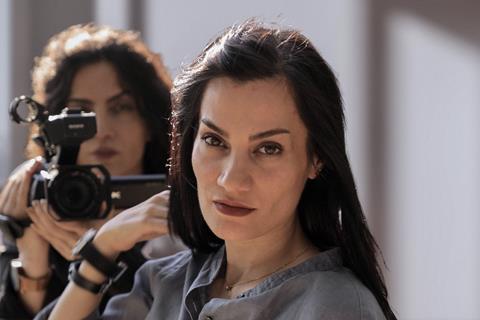Iranian documentarian Leila Amini follows her sister over seven years as she attempts to make it as a singer in Tehran

Dir: Leila Amini. Switzerland/France/Iran. 2024. 93mins
As the public struggle for women’s rights in Iran continues, documentarian Leila Amini is the latest director to turn her camera on revolution and rebellion in the country’s domestic spaces. She captures the daily life of her older sibling Nasreen and her family over seven years, as her sister decides to embrace her love of singing following the birth of her second child. It’s an aspiration that faces challenges not only in terms of Nasreen’s own confidence and the lack of support from her husband Mohamad, but also on a practical level – solo public performance by women has been banned in Iran since 1979.
A statement of solidarity and resistance
Like Farahnaz Sharifi’s My Stolen Planet, this is a personal story which reflects the wider societal dissatisfaction of women whose dreams continue to be oppressed. Having opened the Semaine de la Critique sidebar at Locarno, A Sisters’ Tale will travel on to Toronto. That is likely to be the first of many berths for this engagingly intimate documentary.
The film begins a few months before Nasreen’s daughter Hana turns one (she has an older son, Hamid). Looking for more in her life, she’s ”returning to who I used to be,” she insists, getting a treble clef tattoo on her arm as a statement of intent. As her sister, Leila is already embedded tightly within the family unit and everyone including Mohamad, Leila and Nasreen’s other sister Sareh takes the camera largely in their stride – at least initially.
Nasreen has talent. We see her practising and, though her singing hopes end up being just one part of what will become a journey of emancipation, they offer an insight into the difficulties women face if they try to raise their voices. One attempt at a recording session, for example, takes place within a car but has to be cut short due to the aggressively revving bikes of a nearby motorcycle gang.
While Mohamad doesn’t say much, it’s evident from the dismissive asides he makes to his son Hamid that he disapproves of the singing. We also see how Nasreen ends up borrowing money from Hamid to help realise her dream because she can’t ask his father. Even Hana seems to be a critic of sorts, crying whenever her mum performs. Mohamad is also rarely there, working exceptionally late nights as a motorbike mechanic, which increasingly adds friction to their arranged marriage. Despite living what most people would consider a middle-class comfortable life, happiness is not a given.
Leila and her camera are careful observers, capturing the effect Nasreen and Mohamad’s rows have on their children, but she also acts as a confidante and outlet for Nasreen. On more than one occasion we are treated to a skewed shot simply because the director has put aside the camera to give her sister a hug, which lends her work an endearing intimacy. Suffering from postnatal depression and longing for explicit shows of affection from Mohamad, we see how Nasreen even goes under the knife in a bid to attract his attention. Tellingly, he doesn’t visit her in hospital. It also becomes clear that all three sisters and their mother have to contend with additional patriarchal complexity because their father is no longer alive.
The breakdown of the marriage is accompanied by a growing sense of confidence in Nasreen about what she wants from life, including a pertinent second tattoo. She is helped by the fact that her documentarian sister is with her every frame of the way. As with My Stolen Planet, the act of filming becomes not just a document, but a statement of solidarity and resistance in itself.
Production companies: Mira Film, Docmaniacs
International sales: Mira Film, info@mirafilm.ch
Producers: Afsaneh Salari, Vadim Jendreyko, Leila Amini
Cinematography: Leila Amini
Editing: Audrey Maurion, Leila Amini, Morteza Payeshenas
























